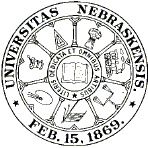
University Studies (University of Nebraska) (1888–1984)
Date of this Version
July 1892
Abstract
Some ten years or more ago, on first attempting to teach English Literature historically, I found my attention peculiarly drawn to the differences of form between the sentences of More, Hooker, Lyly, and other early prosaists, and of approved stylists in our own age. Here was clearly an organic and sustained development, yet without scientific recognition of a single fact or principle of change. It seemed that something might easily be done towards determining the course of an evolution so evident and remarkable. But I had, or believed I had, no leisure for serious study of the subject, and found my interest inadequate to more than fitful theorizing as to what might one day be found at bottom. Certain phases in the development seemed probable enough, and from time to time I ventured talking incidentally to my classes concerning the structural reforms which must have preceded or enabled the simplicity and energy of our best modern prose. This was in reality, of course, much as if some barber surgeon of the middle age had assayed to divine and declare the processes of organic chemistry or embryology, and I think I realized the absurdity of it to some degree. At length it occurred to me it should be no long task at least to ascertain approximately how much the English sentence had shortened since the beginnings of modern prose. So I began simply counting the number of words in the periods of Chaucer, Fabyan, Ascham, Spenser, Lyly, and Joseph Hall, in order to determine an average for each and for the period in general, as means of comparison with later times. In this attempt I realized at once, what I had failed to comprehend before, that the punctuation in early writers is often signally false to both form and sense, therefore could not fail to misrepresent the authors and period in hand. But all such considerations, until some sort of foothold might be - reached, were disregarded; a period as found was taken as a period, no matter if beginning with a which or when, and ending without principal verb.


Comments
Published in UNIVERSITY STUDIES, Vol. I., NO. 4, JULY, 1892. Published by University of Nebraska - Lincoln.